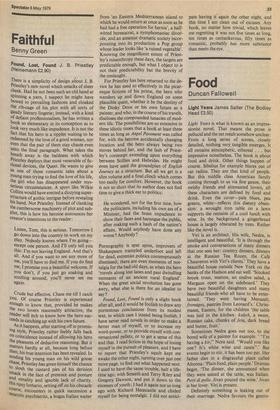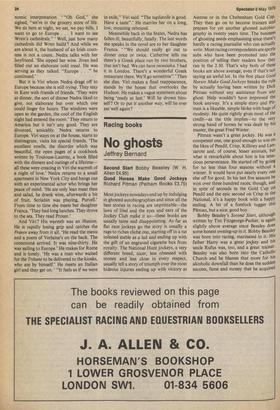Food
Duncan Fallowell
Light Years James Salter (The Bodley Head E3.50) Light Years is what is known as an impressionist novel. That means the prose is pellucid and the net result somehow unclear. From a long series of scenes, closely detailed, nothing very tangible emerges. It all remains atmospheric, ethereal . . . but impressive nonetheless. The book is about food and drink. Other things happen of course. Sibelius for example blares out of car radios. They are that kind of people. But this middle class American family coming through to us via fine gauze, their swishy friends and attenuated lovers, all these characters are defined by food and drink. Even the cover—pale blues, pea greens, white—reflects this dietary obsession: a wrought iron table on a lawn supports the remains of a cool lunch with wine. In the background a gingerbread house is largely obscured by trees. Rather like the novel is.
Viri is an architect. His wife, Nedra, is intelligent and beautiful. 'It is through the smoke and conversations of many dinners that one sees her: country dinners, dinners at the Russian Tea Room, the Café Chauveron with Viri's clients.' They have a beautiful house outside New York on the banks of the Hudson and eat well. 'Smoked brook trout, mutton, an endive salad, a Margaux open on the sideboard.' They have two beautiful daughters and many beautiful friends who all have to be entertained. 'They were having Mersault, fromages, pastries from Leonard's.' Christmases, Easters, for the children 'the table was laid in the kitchen: kulich, a sweet, Russian cake, chunks of feta, dark bread and butter, fruit.'
Sometimes Nedra goes out too, to the bored wife of a painter for example. having a kir," Nora said. "Would you like one? It's white wine and cassis".' But events begin to stir, it has been too pat. Her father dies in a disgraceful place called Altoona : 'Plain food, plain people.' Dramas begin. 'The dinner, she announced when they were seated at the table, was Italian. Petri di polio. Jivan poured the wine.' Jivan is her lover. Viri is present.
Definitely something is leaking out of their marriage. Nedra favours the gastro nomic interpretation. ' "Oh God," she sighed, "we're in the grocery store of life. We sit here at night, we eat, we pay bills. I want to go to Europe . . . I want to see Wren's cathedrals." 'Well, just how many cathedrals did Wren build? And while we are about it, the husband of an Irish countess is not a count. Nedra talks with her boyfriend. 'She sipped her wine. Jivan had filled out an elaborate cold meal. He was serving as they talked. "Europe . . ." he continued.'
But it is Viri whom Nedra drags off to Europe because she is still trying. They stay in Kent with friends of friends. 'They were at dinner, the sort of dinner Nedra liked to give, not elaborate but over which one could linger for hours. The windows were open to the garden, the cool of the English night had entered the room.' They return to America but it isn't any good. They are divorced, amicably. Nedra returns to Europe. Viri stays on at the house, starts to disintegrate, visits his special friends. 'The excellent smells, the disorder which was beautiful, the open pages of a cookbook written by Toulouse-Lautrec, a book filled with the dinners and outings of a lifetime— all these were creating in Viri the warmth of a night of love.' Nedra returns to a small apartment in New York City and hangs out with an experimental actor who brings her peace of mind. 'He ate only lean meat then and salad, he drank wine, afterwards a bit of fruit. Scriabin was playing, Purcell.' From time to time she meets her daughter Franca. 'They had long lunches. They drove to the sea. They read Proust.'
And Viri ? His warmth was an illusion. He is rapidly losing grip and catches the France away from it all. 'He read the menu and a poem of Verlaine's on the back. The consommé arrived. It was nine-thirty. He was sailing to Europe.' He makes for Rome and is lonely. 'He was a man who waited for the Tribune to be delivered to the kiosks, who ate by himself.' He meets an Italian girl and they get on. "It feels as if we were in exile," Viri said. "The tagliatelle is good. Have a taste": He marries her on a long, low, moaning rebound.
Meanwhile back in the States, Nedra has fallen ill, beautifully, fatally. The last words she speaks in the novel are to her daughter Franca. "We should really go out to dinner once or twice. Catherine tells me there's a Greek place run by two brothers, that isn't bad. We can have moussaka. I had it in London. There's a wonderful Greek restaurant there. We'll go sometime": Then she dies. Viri makes a final reappearance, stands by the house that overlooks the Hudson. He makes a vague statement about being 'ready at last.' Will he drown himself? Or to put it another way, will he ever eat well again?



































 Previous page
Previous page